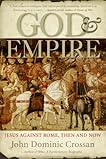 God and Empire: Jesus Against Rome, Then and Now by John Dominic Crossan
God and Empire: Jesus Against Rome, Then and Now by John Dominic CrossanThis is one of Crossan's finest works. The basic premise is that the Kingdom of God as understood by Jesus and the "Lordship of Christ" as taught by Paul are anti-imperial - not just anti-Rome, which of course they are, but opposed to what Crossan aptly calls "the normalcy of Civilization."
Crossan argues, quite compellingly, that the normalcy of civilization is both a hierarchy which privileges some and oppresses and exploits others, and is also committed to violence - the claim that peace can only be achieved by violent conquest of one's enemies and violent punishment of those who upset the established order. Anyone who knows anything about human history will see that Crossan is clearly correct that this is indeed the normal way human civilization operates.
The alternative vision of Jesus and Paul negates the normal ways of civilization. Jesus and Paul preach an egalitarian vision in which all stand equal before God and are called to share equally in each other's resources. Furthermore, Jesus and Paul eschew violence in favor of a non-violent (but nonetheless fiercely resistant) approach to living and being. (Simply read Matthew 5-7, Acts 4:32-35, and Galatians 3:28 and you will quickly see that Crossan has solid textual support for his position).
In short, for Jesus, and Paul after him, God is known to us in a life of non-violence and distributive justice. They offer us a world where all share God's resources equally and live together peacefully. And they offer this world as the divine counter vision of "the normalcy of civilization."
Near the end of the book Crossan contrasts the non-violent Jesus who walked the earth with the fantasy of violent retribution found in the Jesus of Revelation and much current theology. We cannot have both, we must choose either a violent or non-violent Jesus. The former is the Jesus of apocalyptic vengeance, the later the Jesus of history. The two are not compatible.
The choice is important, Crossan argues, not merely because only non-violence and egalitarianism can save the human race, but also because the choice determines how we see God. Is God a patriarchal and violent deity? Or a non-violent and egalitarian deity? How we see God is crucial, for we act out what we think God is like.
A fine read and a must read for anyone who, as we all should be, is worried about the rise of "violent religion" in much of the world today.
Here is a nice summary of one of the main themes by Crossan himself:
No comments:
Post a Comment
Comments from many different points of view are welcome. But I will not publish any comments that are hateful, insulting, or filled with profanity. I welcome and encourage dialogue and disagreement but will not publish any hate speech.